Customers should feel like they matter.
But it’s difficult when your team is bogged down answering the same questions over and over again.
Good news—these days, AI customer support software can take the pressure off your agent’s shoulders.
Imagine all those repetitive questions being answered automatically. Your team gets to focus on the stuff that really matters, like the tricky, out-of-the-blue queries that take longer to resolve or the ones that lead to a sale.
Read on to see how AI can transform your customer service for the better.
In this article:
- What AI customer support software is
- Examples of AI applications in customer service
- Detailed reviews of the platforms
- Main benefits of the system
- Challenges of AI customer service solutions
Get the best AI customer software on the market
If you want to find out more about AI in customer service, check out these articles:
- AI Customer Service: All You Need to Know [+Examples]
- 10+ Crucial AI Customer Service Statistics
- 22 Best AI Chatbots: ChatGPT & Alternatives
Before we jump into the platforms, let’s learn some background information—
What is AI customer support software?
AI customer support software solutions are like intelligent and responsive assistants that cut down your workload. The software can understand customer questions, answer common queries, handle simple tasks automatically, and much more.
The software improves with every interaction it has with people. The built-in machine learning engine improves itself by identifying patterns in customer questions. Over time, your team has fewer and fewer repetitive tasks to handle, freeing up time to nurture customer relationships and offer a human touch.
Read more: Discover the differences between chatbots vs conversational AI with examples of both.
Examples of AI in customer support
There are a variety of AI solutions for customer service. Let’s look at each one individually, but bear in mind that some platforms bundle these solutions together in packages.
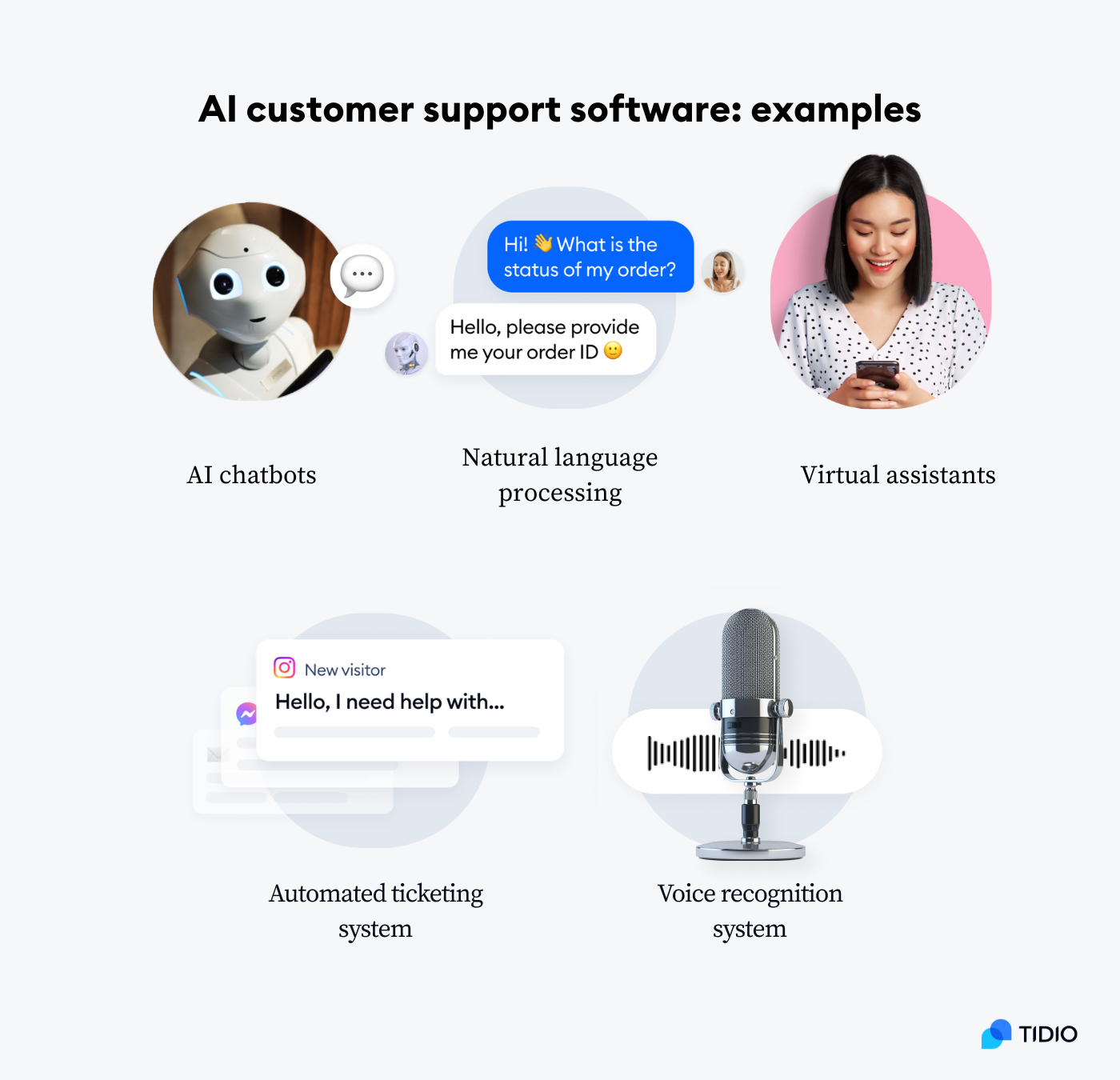
AI-powered chatbots
A 24/7 frontline team that is good at handling the basics, such as FAQs, password resets, and checking order status—i.e. simple questions that eat up a lot of time. Some AI systems understand customer sentiment and figure out when to hand the conversation over to a live agent.
Natural Language Processing (NLP)
NLP chatbots make it feel like you’re talking to a person rather than a robot. It helps the AI understand the nuance of human speech and get to the bottom of what people are actually asking.
Virtual assistants
An AI virtual assistant understands more complex tasks and might have voice capabilities. Some can reschedule appointments or walk people through a product setup based on their purchase history.
Automated ticketing systems
Automated ticketing systems remove the need for manual sorting by fielding incoming messages and emails. This technology figures out what the customer needs, and automatically forwards the details to the right agent.
Voice recognition systems
Voice recognition systems enable users to direct technology by speaking to it. This makes it easy to perform hands-free tasks and get responses. Different voices are identified using automatic speech recognition software.
Top 10 AI customer support software options
With so many options available, we thought it would be helpful to compile a list of the best AI customer support software to consider.
Here’s a comparison table of the tools:
| Software | G2 rating | Free plan | Best for |
|---|---|---|---|
| Tidio | 4.7/5 ⭐️ | ✅ | AI chatbots |
| Zendesk | 4.3/5 ⭐️ | 14-day free trial | Intuitive interface |
| Freshdesk | 4.4/5 ⭐️ | ✅ | Analytics and reporting |
| Kustomer | 4.4/5 ⭐️ | Six-month free trial | Automated data management |
| Help Scout | 4.4/5 ⭐️ | 15-day free trial | Robust APIs |
| Dialogflow | 4.4/5 ⭐️ | $300 in free credits | AI voice recognition |
| Intercom | 4.5/5 ⭐️ | 14-day free trial | Collision detection |
| Hubspot | 4.4/5 ⭐️ | ✅ | Contact management |
| Tiledesk | 4.7/5 ⭐️ | 14-day free trial | Multichannel |
| Zoho Desk | 4.4/5 ⭐️ | 15-day free trial | Automated ticket assignment |
And here are detailed reviews of the best AI platforms for your customer service team:
1. Tidio
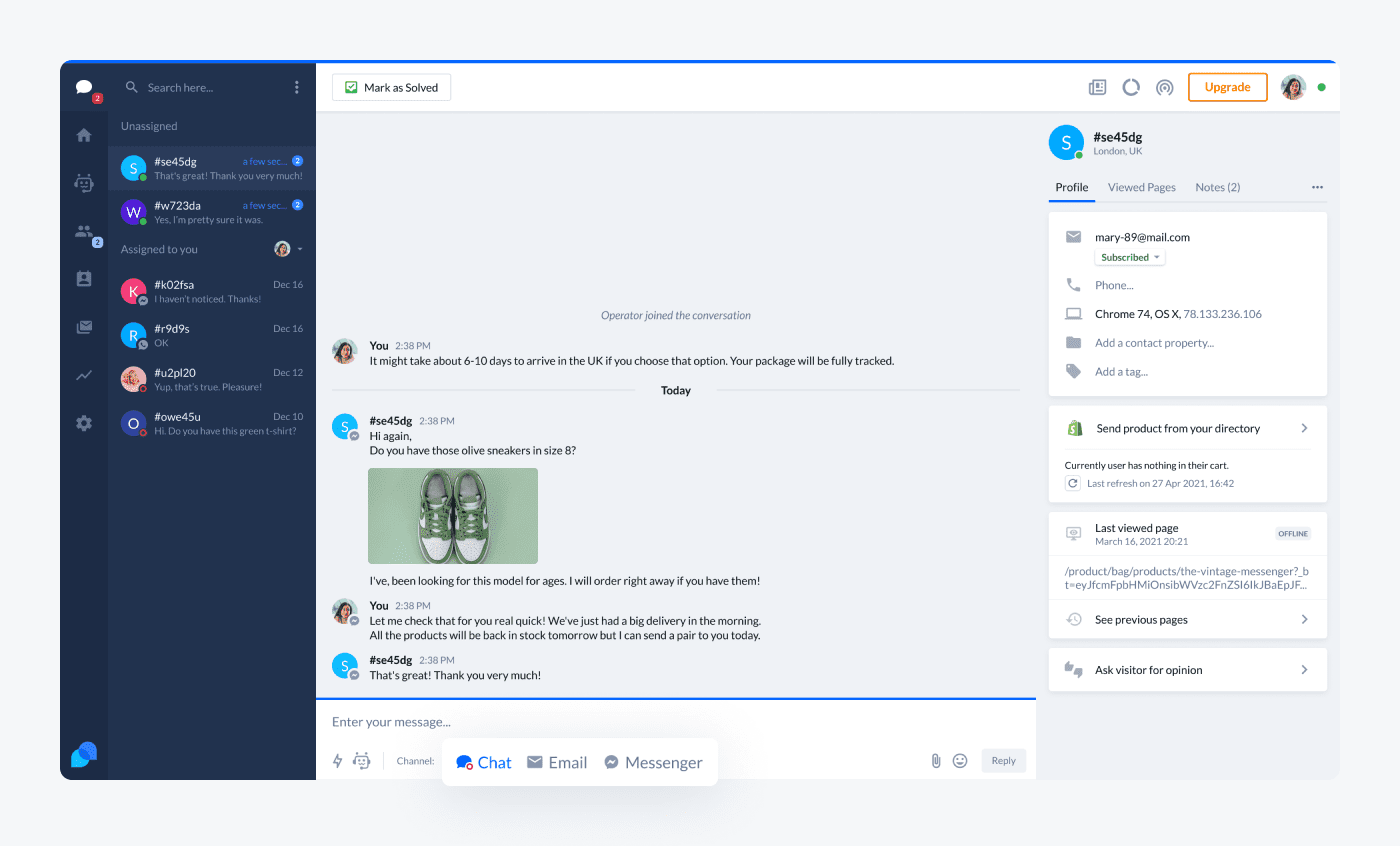
Rating: 4.7/5 ⭐️ (1,410+ reviews)
Tidio is an AI customer support software solution for online businesses. The dashboard is easy to use, so your team can become experts in no time, managing all customer inquiries across multiple channels including email, live chat, and social media. You get a lot of AI help desk tools to steamline your processes—all in one affordable platform.
You can choose from more than 35 chatbot templates, design your own chat flows, or use conversational AI, Lyro. Tidio is the perfect AI customer support solution, but don’t just take our word for it, sign up for a free trial and see for yourself.
Key features:
- AI-driven visitor segmentation
- Multichannel support
- AI and NLP chatbots
- Unified helpdesk system
- Built-in email marketing
- Free
- Email marketing ($10/mo)
- Starter ($29/mo)
- Automation ($29/mo)
- Growth ($59/mo)
- Lyro AI ($39/mo)
- Tidio + (starting from $499/mo)
Enjoy the benefits of an AI customer service tool from today
Read more: Find out how to enable Tidio’s conversational AI, Lyro, on your website.
2. Zendesk
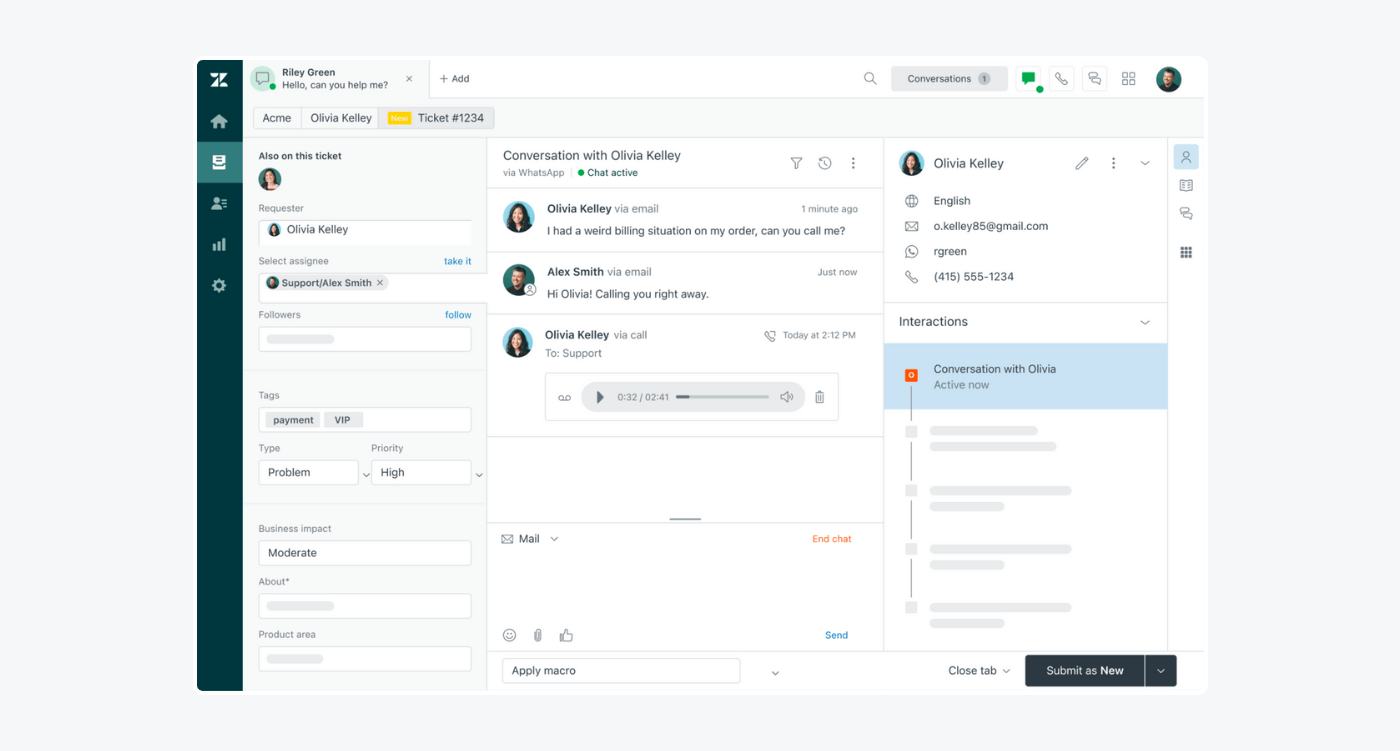
Rating:4.3/5 ⭐️ (5,800+ reviews)
Zendesk Support Suite is an AI customer support solution that aims to simplify customer workflows across multiple channels. It integrates with email, chat, and social messaging apps such as Facebook and WhatsApp.
This platform features a range of AI tools for client support, such as automated ticket routing, AI chatbots, and auto-replies.
Pros:
- Intuitive interface
- Range of automations
- Detailed chatbot analytics
Cons:
- Advanced customization requires technical skills
- Occasionally slow support responses
- Less flexible pricing for smaller budgets
- Basic plans (start at $19/mo)
- Suite Team ($59/mo/agent)
- Suite Growth ($89/mo)
- Professional ($115/mo)
- Suite Enterprise → contact sales team
Read more: Discover the best Zendesk alternatives your customer service agents would love.
3. Freshdesk
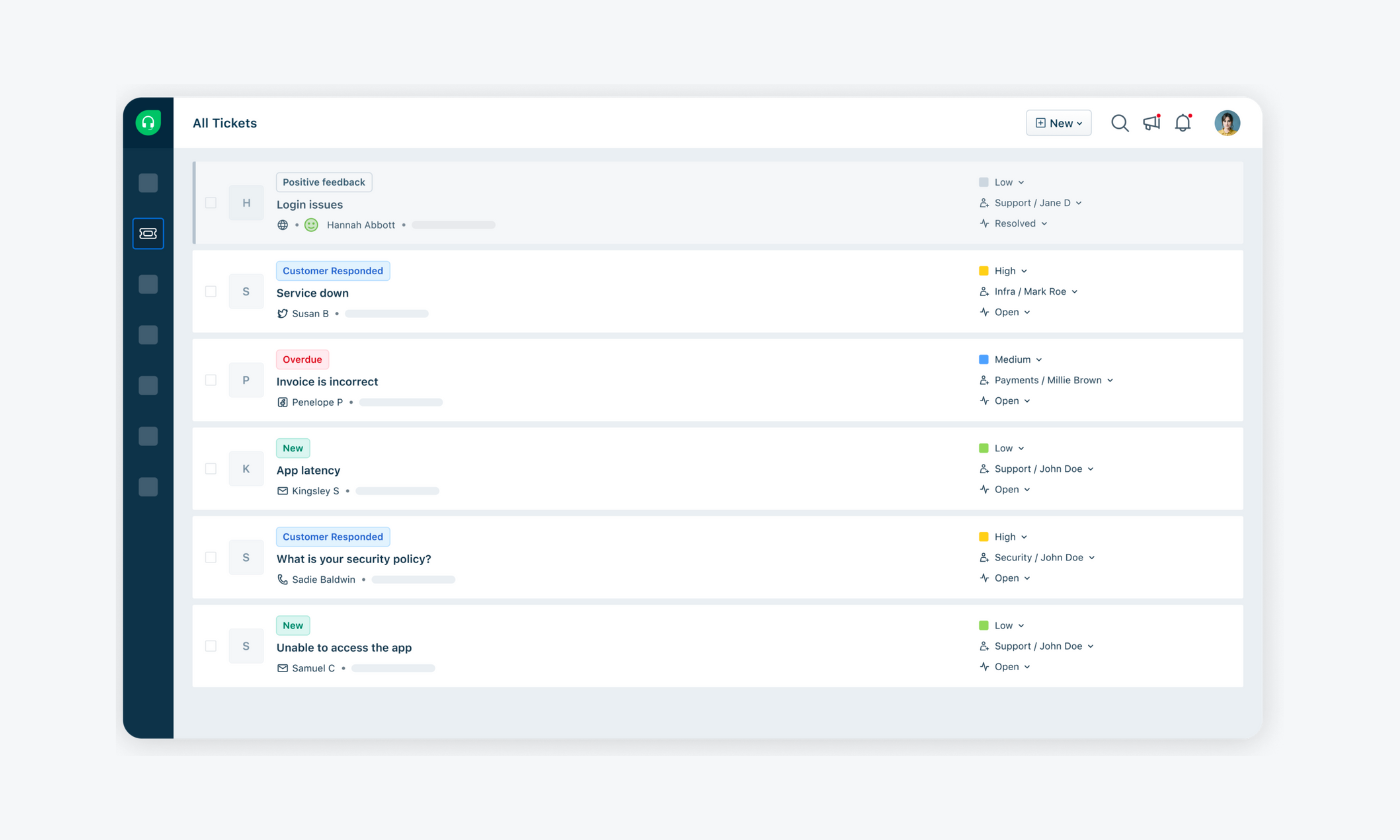
Rating:4.4/5 ⭐️ (3,090+ reviews)
Freshdesk is a popular AI customer support solution that helps businesses bring multiple support channels together in one place. The system turns email, web, phone, chat, messaging, and social media requests into tickets with AI automated features to streamline the process.
This system includes features such as AI-powered ticket routing, smart responses, and agent assist tools, which speed up query resolution.
Pros:
- AI-assisted ticket prioritization and resolution
- Single inbox for all customer communication
- Customized insights and reporting dashboards
Cons:
- AI features are available on more expensive plans
- Steep learning curve for the system for teams
- Customization options need some technical skills to implement
- Free version available
- Growth ($18/mo/agent)
- Pro ($59/mo/agent)
- Enterprise ($95/mo/agent)
Read more: Check out the top Freshdesk alternatives that can help your team handle customer requests more efficiently.
4. Kustomer
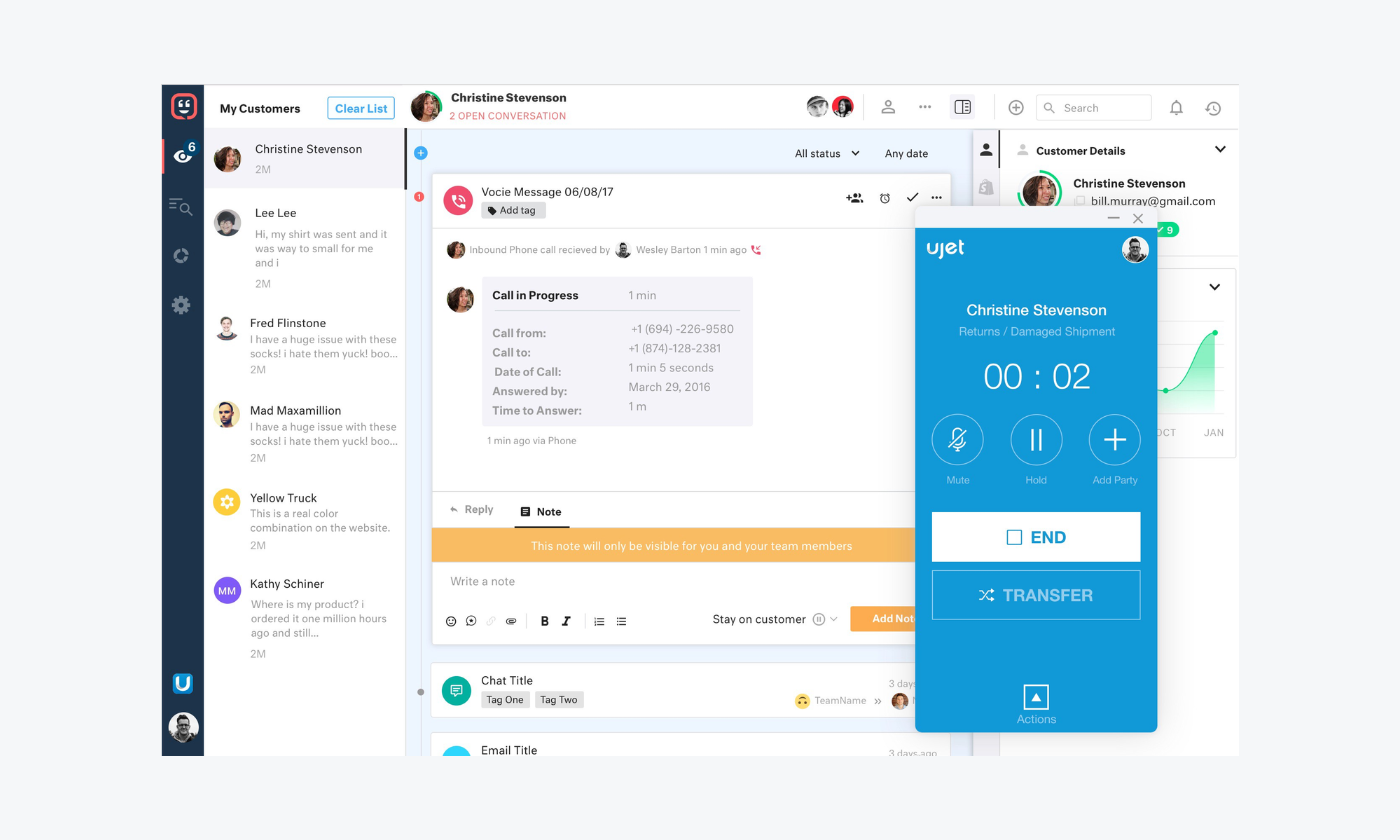
Rating:4.4/5 ⭐️ (410+ reviews)
Kustomer is an AI-driven CRM platform that handles high-volume support requests. It automates customer service through AI chatbots, self-service, and intelligent routing.
This open CRM platform helps businesses manage data and streamline processes in a scalable way. Kustomer IQ, the platform’s AI component, is applied throughout to eliminate repetitive tasks and power client interactions.
Pros:
- AI integration across the board
- Shared inbox for all communication channels
- Automated data management
Cons:
- Prohibitively high pricing for small businesses
- Some features may be complex for new users
- Third-party integrations require technical skills
- Enterprise Plan ($89/mo/user)
- Ultimate Plan ($139/mo/user)
Read more: Learn what customer journey map is and how to create one.
5. Help Scout
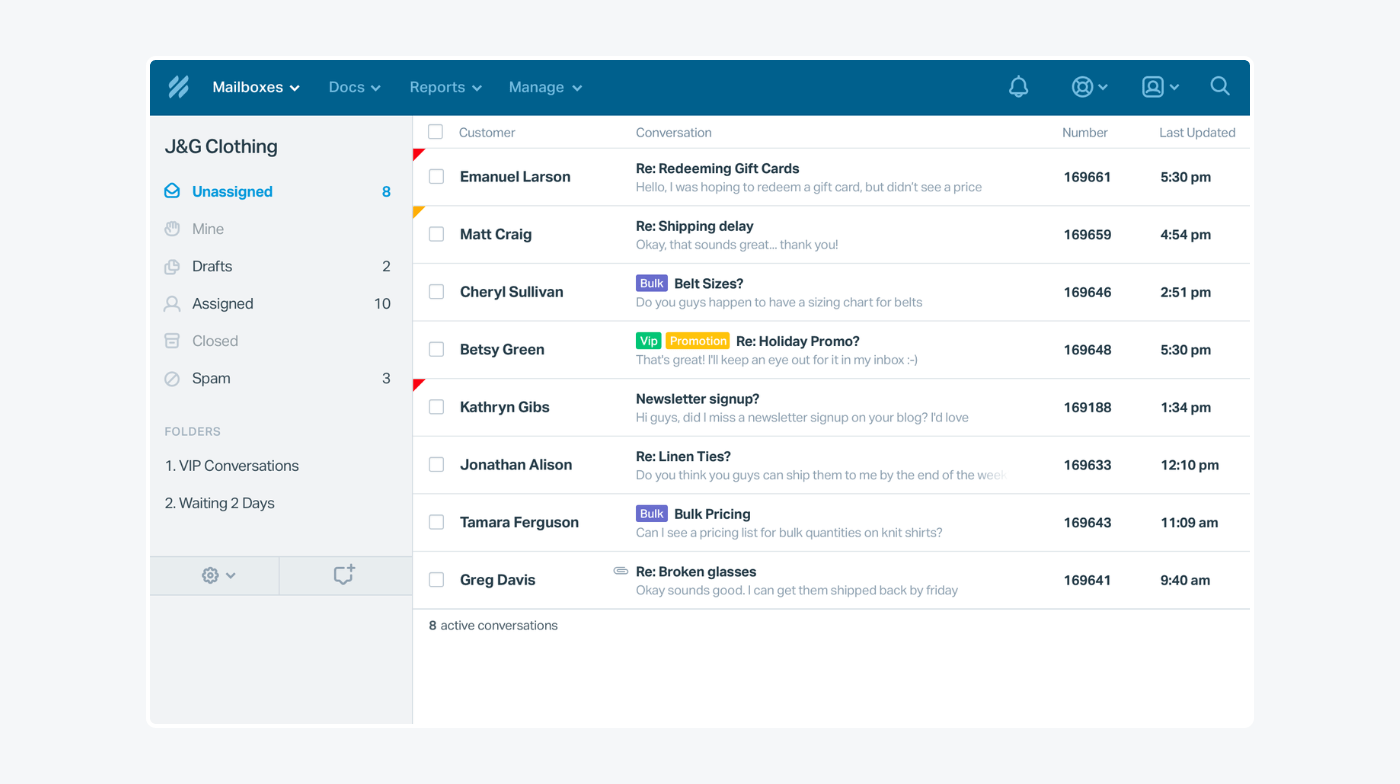
Rating:4.4/5 ⭐️ (400+ reviews)
Help Scout AI customer support software offers an easy-to-use platform, robust APIs, and various integrations. The system is designed for quick setup with integrated email, self-service, and live chat capabilities.
The platform includes a range of AI features that streamline processes without the need for coding or plugins. You can also customize this AI support software to your team’s needs for improved efficiency.
Pros:
- Variety of powerful APIs
- Customizable rules for automations
- Canned responses library available
Cons:
- Spam filters need improvements
- Only one template for the knowledge base
- Limited reporting features
- Free 15-day trial
- Standard ($25/mo/user)
- Plus ($50/mo/user)
- Pro ($65/mo/user)
Read more: Discover the top Help Scout competitors that will boost your contact center efficiency.
6. Dialogflow
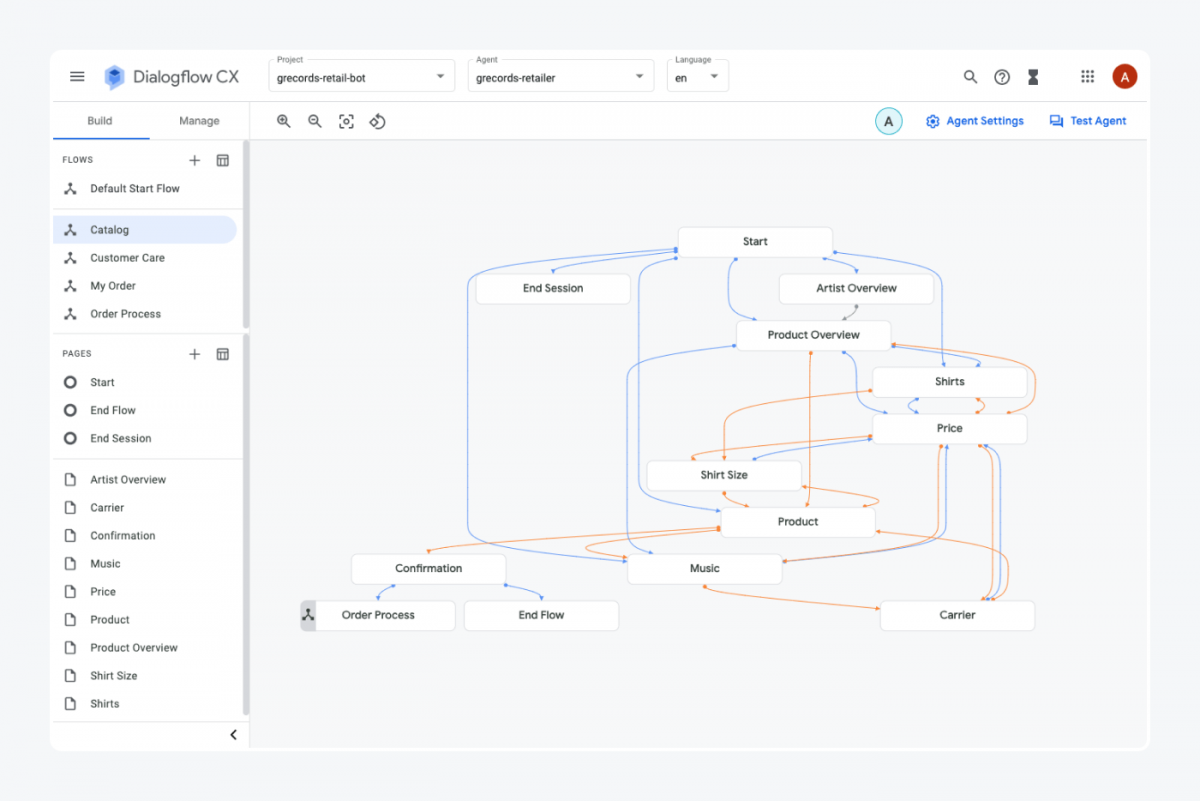
Rating:4.4/5 ⭐️ (100+ reviews)
Google Cloud Dialogflow offers conversational AI tools for customer service. There are two main chatbot and voicebot versions available—ES standard agents for SMEs and CX advanced agents for larger and more complex use cases.
This software from Google is based on BERT language model and integrates with many channels seamlessly including website, Apple iOS, and Android mobile applications. It provides a visual builder and AI voice chatbots that help to provide more efficient support for shoppers.
Pros:
- User-friendly bot builder
- Integrates with voice interface platforms
- Wide range of analytics and reports
Cons:
- Need technical skills to customize beyond templates
- Pay-as-you-go pricing structure may result in unexpectedly large bills
- Integrations are complex to implement
- CX Agent Text Requests ($0.007/request
- CX Agent Audio Input/Output ($0.001/sound)
- ES Agent Text Requests ($0.002/request)
- ES Agent Audio Input ($0.0065/15 seconds of audio)
Read more: Learn about customer satisfaction surveys and how to measure your score (CSAT).
7. Intercom
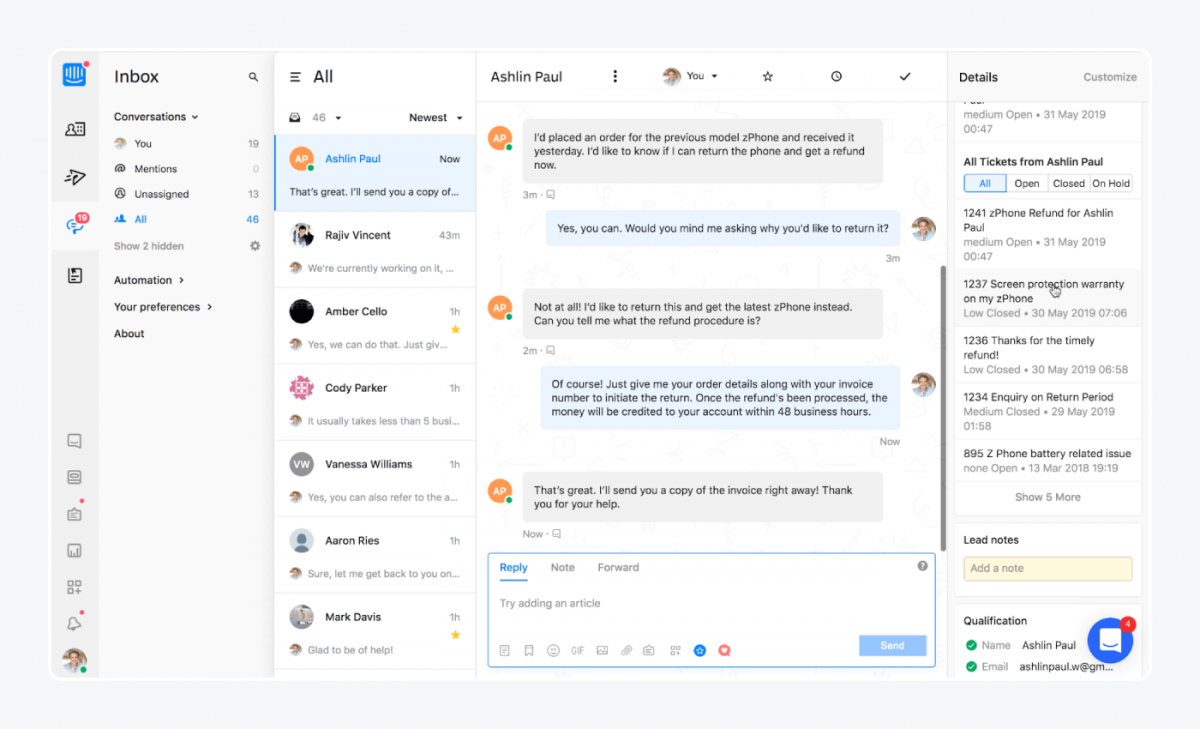
Rating:4.5/5 ⭐️ (2,940+ reviews)
Intercom is an AI customer support solution with streamlined chat and messaging services. It provides a variety of tools such as AI-driven chatbots, targeted messaging, and automated workflows. Intercom is known for its wide range of customizable features and analytics.
This platform allows you to add rules to your funnel in order to improve workflows and automation. It also automatically sorts visitors into various categories to help you with any future interactions.
Pros:
- Collision detection for requests
- Multilingual support available
- Workflow monitoring and reporting
Cons:
- Relatively expensive compared to other AI customer support software
- More advanced features are complex to implement
- Limited customization in basic plans
- Essential ($39/mo/seat)
- Advanced ($99/mo/seat)
- Expert ($139/mo/seat)
Read more: Check out the best Intercom alternatives to use as your customer service tools.
8. Hubspot Service Hub
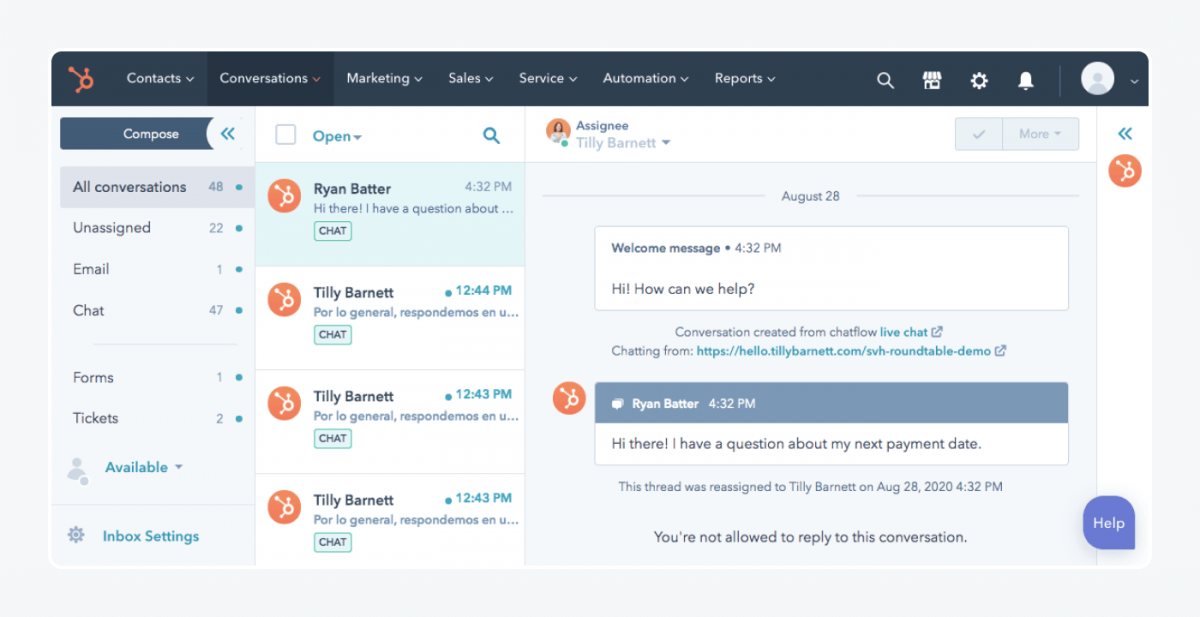
Rating:4.4/5 ⭐️ (2,200+ reviews)
HubSpot Service Hub is an AI customer support platform that helps businesses deliver support at scale. As well as AI automation features, it provides data-driven insights and features such as advanced ticketing systems, knowledge bases, and customer feedback tools.
This platform primarily helps you with your marketing and sales goals. It offers tools to convert leads into customers and measure your marketing efforts effectively.
Pros:
- Omnichannel messaging available
- AI-powered conversation and call analysis
- Contact management and customer profiling
Cons:
- Complex setup process
- Difficult to navigate between tickets and inbox
- Limited customization in basic plans
- Free plan available
- Starter ($20/mo)
- Service Hub Professional ($100/mo/user)
- Service Hub Enterprise ($130/mo/user)
9. Tiledesk
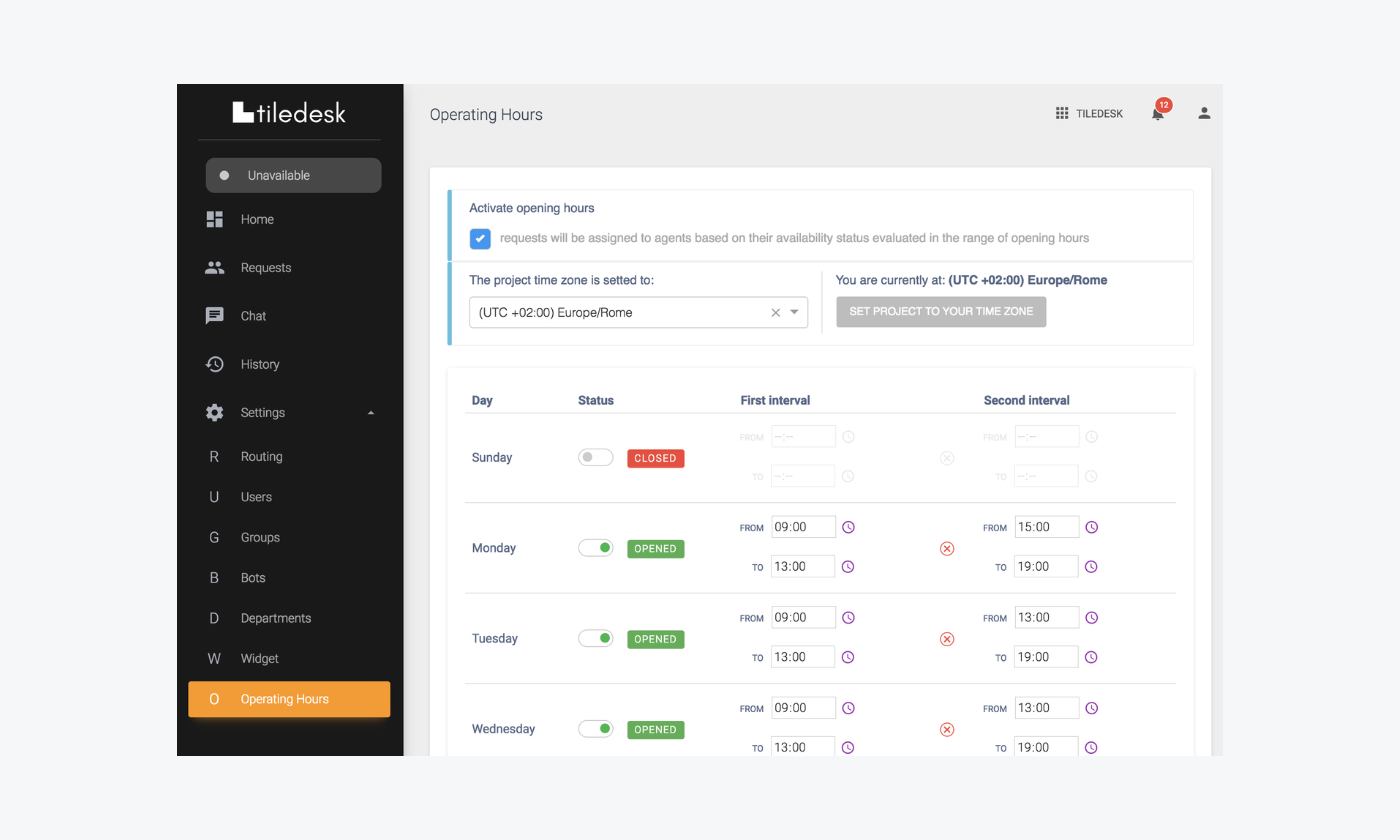
Rating:4.4/5 ⭐️ (10+ reviews)
Tiledesk is a versatile open-source AI customer support solution with features such as chatbots powered by Chat-GPT and a drag-and-drop interface for simplified bot creation. This makes Tiledesk simple for any level of user and no technical skills are needed.
This software offers community support and great customer service whenever you come across any issues with the development or setup of the system.
Pros:
- Easy-to-use graphical layout
- Natural language processing technology
- Supports a variety of channels and integrations
Cons:
- Complex self-hosting options
- Configurations might be overwhelming
- Limited customization options
- Free forever plan available
- Basic ($15/mo)
- Premium ($100/mo)
- Custom → contact sales team
Read more: Learn what a helpdesk workflow is and how to implement it.
10. Zoho Desk
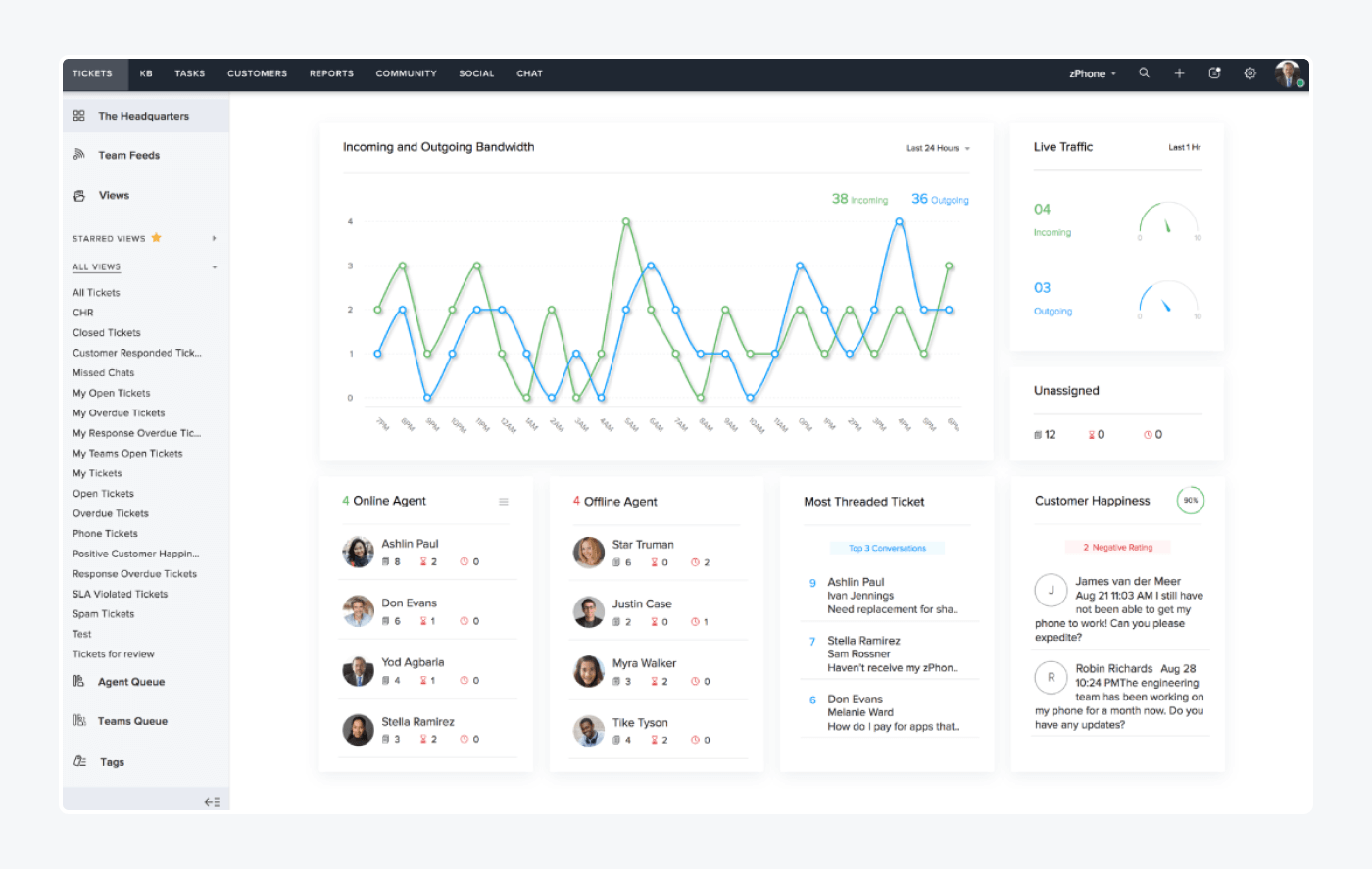
Rating:4.4/5 ⭐️ (5330+ reviews)
Zoho Desk is an AI customer support solution that integrates communication from various channels including phone, email, live chat, and social media into a single interface. It offers an easy-to-use interface with good onboarding material, so your team can get started with the system in no time.
This platform routes and assigns calls to appropriate agents in a flexible and customizable way. AI features include automated ticket routing and predictive support capabilities.
Pros:
- Automated ticket assignment and management
- Centralized data from multiple sources
- Integrates with the wider Zoho ecosystem
Cons:
- Complex features may be difficult for new users
- The mobile app is limited compared to the desktop version
- Variable customer support response times
- Free plan available
- Express ($7/mo/agent)
- Standard ($14/mo/agent)
- Professional ($23/mo/agent)
- Enterprise ($40/mo/agent)
Read more: Check out the top chatbot platforms and choose the best one for your business.
Now let’s explore some of the main reasons for integrating AI customer service software into your workflows.
Benefits of AI customer support solutions
When you use AI technology you can provide proactive service for your website visitors and boost their customer satisfaction without scaling your support team. But that’s not all of the benefits that AI-powered customer service can provide for your business.
Here are several key areas where AI customer service solutions can benefit your business.
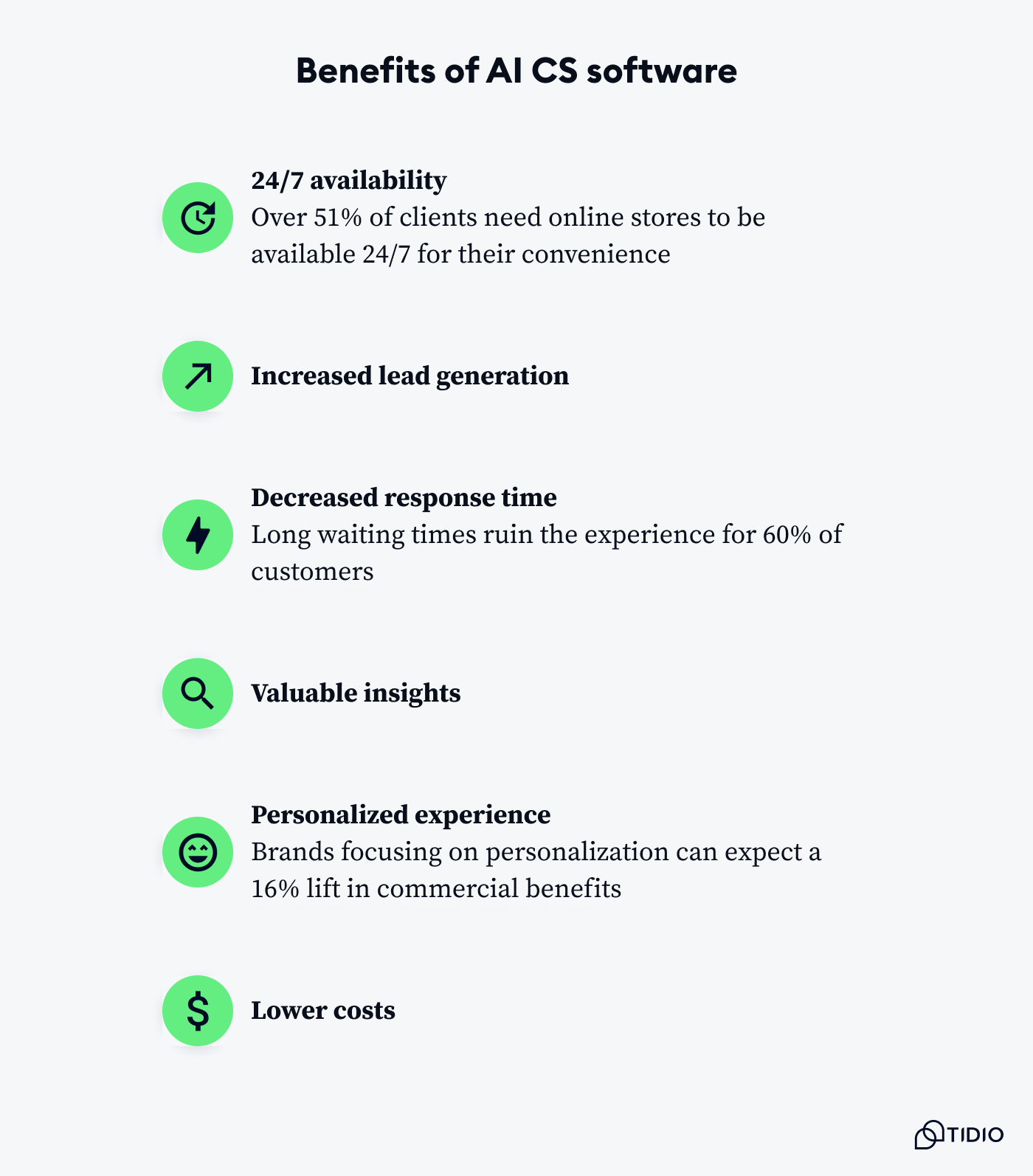
24/7 availability
AI never sleeps, making it ideal for businesses with a global customer base or those who need to offer support outside traditional business hours. Even when your team is offline, AI can provide real-time support, handle basic inquiries or collect visitor information.
In fact, over 51% of shoppers admitted that they need ecommerce stores to be available at 24/7 for their convenience.
Decreased response time
Long waiting time ruins the customer experience for almost 60% of people. But AI can speed things up by automating simple tasks, and helping agents with more complex support queries. This includes analyzing incoming inquiries, gathering relevant user information, determining urgency, and providing self-service options for the visitor.
Increased lead generation
AI-powered lead generation makes it much easier to find potential customers. It goes beyond simple website scraping and helps to find ready-to-buy leads. The system does this by analyzing your past sales data (customer profiles, purchase histories, etc.), and finding common traits among your best customers. It then uses these patterns to find new leads that share those desirable characteristics.
Read more: Discover how Endeksa increased lead generation by 138% using Tidio.
Lower costs
The potential efficiency gains of AI customer service software add up to noticeable savings over time. Of course, you need to factor in the initial cost for the platform itself, along with any setup or integration help you might need.
The key is to think long-term. The savings come from reducing the workload on your human team and the potential for scaling your support without needing to proportionally scale your headcount.
Personalized experience
Think back to the last time you received good customer service. What made it stand out? It’s likely that you felt like your specific needs were taken into account. You didn’t feel like a number or just another customer.
A good quality AI system tailors support by gathering customer data from past purchases and interactions, website behavior, and demographics. This is important as a Gartner study revealed that brands focusing on “help me” personalization can expect a 16% lift in commercial benefits.
Valuable insights
Another major benefit of AI customer service software is that it does a lot more than deliver basic analytics. You can use it to gain actionable customer insights from your raw data, helping you understand your customers on a whole new level.
Many AI tools for customer service analyze how shoppers interact with your company across multiple channels, identifying browsing trends, purchases, and support needs. Even more than that, using NLP, the AI model can work out the emotions behind customer feedback to give you insights into sentiment.
Implementing AI customer support software: common challenges
Sometimes the functionality of the AI solution for customer support isn’t enough to achieve the desired customer engagement. And f you’re looking to implement AI tools for customer service for the first time, then it’s useful to understand the common challenges and limitations of these systems.

Lack of human touch
When customers seek support, they’re often looking for understanding and compassion. AI responses lack the emotional nuance and empathy to deal with tricky situations where extra sensitivity may be needed.
Solution to the challenge:
A hybrid customer service model that combines AI and human agents is best. AI handles the routine tasks, while more complex issues are escalated to support agents.
Read more: Learn what are the biggest chatbot challenges and how to solve them.
Inaccurate or robotic responses
AI systems might respond in a way that is irrelevant or too robotic. AI chatbots have a tendency to be too “wordy” or stilted in style. This system sometimes misunderstands queries due to limited learning data, which can be frustrating for the customer.
Solution to the challenge:
Offer AI chatbots with Natural Language Processing (NLP) capabilities that better understand the context of queries. Regularly update the AI system with new data and customer interaction insights.
Integration difficulties
Integration of AI customer service software into existing workflows can be challenging. This can potentially lead to service delivery disruption and inefficiencies.
Solution to the challenge:
Find an AI customer support solution that integrates more easily with third-party software and workflows. Custom integration solutions or middleware can also make things smoother. For example, Tidio offers over 35 integrations, so you can easily connect your other tools with this customer service platform.
Context and intent understanding
AI may struggle to understand the intent behind a customer’s query, especially if it’s complex or multi-layered. This can result in responses that don’t fully address the customer’s needs or end up in multiple interactions.
Solution to the challenge:
NLP and deep learning AI systems can help the technology grasp the nuance of customer queries. You can train the technology with common queries and question-answer pairs from your FAQ page. Updating the dataset with more interactions can help the AI to recognize intent more accurately.
AI customer support software: key takeaways
Artificial intelligence is a great way to improve the speed of customer support by automating certain elements.
By using features such as AI-powered chatbots, NLP and automated help desk, you can easily take care of simple, repetitive tasks at the first point of contact with a customer. However, a hybrid approach that combines AI with human agents is best, as complex interactions often need a more empathetic and nuanced approach.
So—what’s the best AI customer support solution?
Although there are dozens of AI customer service providers available, only a few stand out above the others, including Tidio, Intercom, and Tiledesk for their advanced AI features.
Why not try one of the best AI customer support solutions on the market today?
Enjoy the benefits of an AI customer service tool from today

